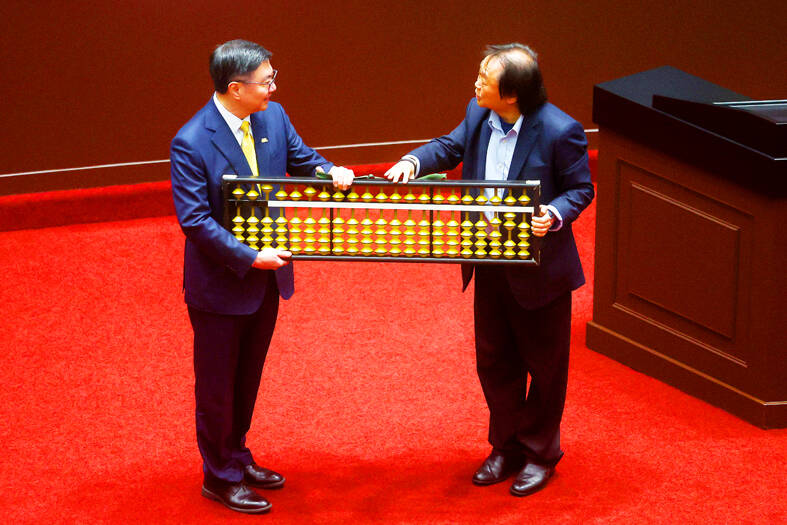President William Lai (賴清德) yesterday promulgated the budget for this year and amendments to the budget allocation act, after the legislature on Wednesday last week rejected the Cabinet’s request to reconsider the bills, the Presidential Office said.
Chinese Nationalist Party (KMT) and Taiwan People’s Party lawmakers, who have a combined majority in the legislature, cut and froze significant parts of this year’s central government budget, and passed amendments to the Act Governing the Allocation of Government Revenues and Expenditures (財政收支劃分法) to allocate a larger share of government revenue to local governments.
The Executive Yuan has warned that the cuts would seriously affect government operations and be unevenly carried out, while the amendments to the revenue allocation act would lead to unfair outcomes and an imbalanced distribution of government funds.

Photo: CNA
The Cabinet requested a review of both proposals, but it was rejected by the Legislative Yuan last week.
In an interview prior to a general policy meeting on Thursday, Premier Cho Jung-tai (卓榮泰) said that budget cuts affect all constitutional institutions except the Legislative Yuan.
The Control Yuan has announced plans to seek a constitutional interpretation and potentially request a temporary injunction.
All the constitutional institutions impacted by the budget and new fiscal reality would act in alignment with constitutional principles and coordinate their responses, Cho said.
The Executive Yuan would also consult with legal experts on further research, he said.
Control Yuan Department of Supervisory Investigation head Yang Chang-hsien (楊昌憲) is to submit a petition for a constitutional interpretation, the branch said yesterday.
The opposition’s budget cuts to the Control Yuan were a “political retaliation,” Control Yuan Secretary-General Lee Chun-yi (李俊俋) told the Liberty Times (sister paper of the Taipei Times) in an interview published yesterday.
“Their purpose is clear. Since they are unhappy that Control Yuan investigations are affecting them,” they slashed the budget to make the branch disappear, Lee said.
Additional reporting by Chung Li-hua

Nipah virus infection is to be officially listed as a category 5 notifiable infectious disease in Taiwan in March, while clinical treatment guidelines are being formulated, the Centers for Disease Control (CDC) said yesterday. With Nipah infections being reported in other countries and considering its relatively high fatality rate, the centers on Jan. 16 announced that it would be listed as a notifiable infectious disease to bolster the nation’s systematic early warning system and increase public awareness, the CDC said. Bangladesh reported four fatal cases last year in separate districts, with three linked to raw date palm sap consumption, CDC Epidemic Intelligence

Two Taiwanese prosecutors were questioned by Chinese security personnel at their hotel during a trip to China’s Henan Province this month, the Mainland Affairs Council (MAC) said yesterday. The officers had personal information on the prosecutors, including “when they were assigned to their posts, their work locations and job titles,” MAC Deputy Minister and spokesman Liang Wen-chieh (梁文傑) said. On top of asking about their agencies and positions, the officers also questioned the prosecutors about the Cross-Strait Joint Crime-Fighting and Judicial Mutual Assistance Agreement, a pact that serves as the framework for Taiwan-China cooperation on combating crime and providing judicial assistance, Liang

Reports of Taiwanese going missing, being detained or interrogated, or having their personal liberties restricted in China increased about fourfold annually last year, the Mainland Affairs Council (MAC) said yesterday. Last year, 221 Taiwanese who traveled to China were reported missing, were detained and interrogated, or otherwise had their personal freedom restricted, up from 55 the previous year, the council said. Reopening group tours to China would be risky, as it would leave travelers with no way to seek help through official channels after Beijing shut down dialogue between the associations tasked with handling cross-strait tourism, the MAC said. Taipei’s Taiwan Strait Tourism

SHIFT: Taiwan is evolving from a transit stop into a tourist destination, with more international travelers willing to spend on tours, dining and cultural activities Taiwan rose three places in the World Tourism Barometer to 36th globally in 2024, with international tourism revenue of US$10.028 billion, the Tourism Administration said on Monday. The UN Tourism Organization publication said that its focus has switched from whether a country has returned to pre-COVID-19 levels of tourism to the amount spent by a tourist during an overseas trip. The nation last year welcomed 8.57 million international tourists, about 9 percent more than in 2024, with most tourists coming from Japan, South Korea, and Hong Kong and Macau, all of which accounted for at least 1 million tourists each. During the first